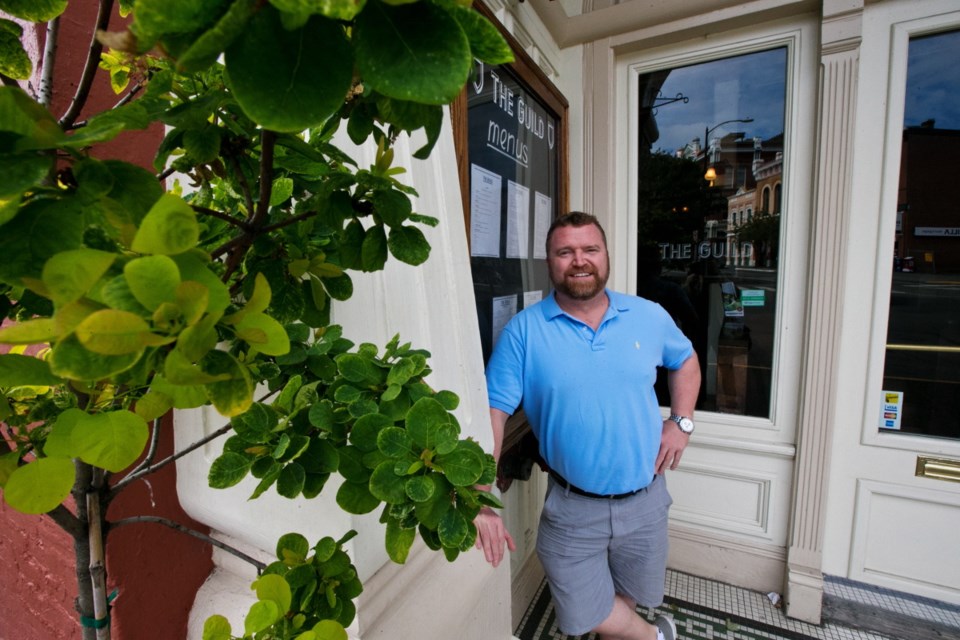A pair of Victoria restaurants have joined the ranks of the carbon-neutral.
Zambri’s and The Guild have joined sister restaurant Big Wheel Burger in reducing their carbon emissions considerably and paying to offset the balance.
“You can’t really be half-way with carbon neutrality,” said Calen McNeil, co-owner of all three restaurants.
“We realized how simple and cost-effective it was at Big Wheel Burger and it was a natural progression for us to do it at the other two restaurants.
“We believe in it and since we were doing it at one we thought we might as well do it at [the others].”
Big Wheel, which was created in 2011 as an attempt by McNeil to do a better kind of fast-food joint, reached its goal of being carbon-neutral after six months in business. It now creates less than 40 tonnes of carbon emissions annually, which it pays to offset.
By comparison, the average fast-food eatery produces about 350 tonnes of carbon each year.
McNeil said turning the attention to Zambri’s and The Guild was fairly easy as the owners had done it before.
“It is simple to do, I think. If people realized how easy it was, I think everybody would be doing it. There may just be a psychological barrier or laziness,” he said.
The restaurants are part of a growing list of Victoria businesses that are carbon neutral, including Habit Coffee, Eagle Wing Tours, Harbour Air, Agenda Office Interiors, Inn at Laurel Point, Victoria Gin and Oughtred Coffee & Tea.
At this point, both Zambri’s and The Guild have cut their emissions to 66 tonnes annually, which the company then pays to offset.
Carbon offsets are investments in green technology that reduce emissions, and would not happen without the influx of cash.
Zambri’s, The Guild and Big Wheel use Vancouver-based Offsetters, which invests in offsetting projects that include capturing methane from local landfills and converting it to usable heating gas, renewable energy projects in India and conserving tropical rainforest in the Democratic Republic of the Congo.
Jill Doucette, founder of Synergy Enterprises, which works with companies to improve their green practices, said restaurants can easily and inexpensively cut their emissions in a third, from the typical 350 tonnes annually.
“The biggest impact with restaurants is waste. They can cut it to 100 tonnes easily by tackling landfill waste, especially with organics in it, as it has such high carbon intensity, and by reducing natural gas use in kitchens,” she said.
Doucette said starting at the source is often most effective, noting ordering in bulk, reducing packaging, opting for fewer deliveries and monitoring how staff get to the restaurant can make a huge difference.
“A lot of changes can come with very little investment,” she said. “You can reduce your total carbon footprint by 10 per cent without dropping a dime.”
Even when you pay for consulting and to offset emissions, the bills seem reasonable.
According to McNeil, the owners spent between $3,000 and $5,000 to go through an analysis at each restaurant and now spend from $100 to $150 per month on each restaurant to offset emissions.
“It’s pretty negligible when you consider how much carbon is reduced,” he said.
“We’ve eaten [the cost] — it’s just something we believe in.”
Doucette said it may also prove to be a competitive advantage, as there is more demand from the public for businesses to be accountable for their environmental footprint.
“When I started Synergy in 2008, we got a lot of blank looks, but now people are more in tune to the idea their customers care about it,” she said. “There’s the culture that it’s the right thing to do and that small business can have a big impact.”



